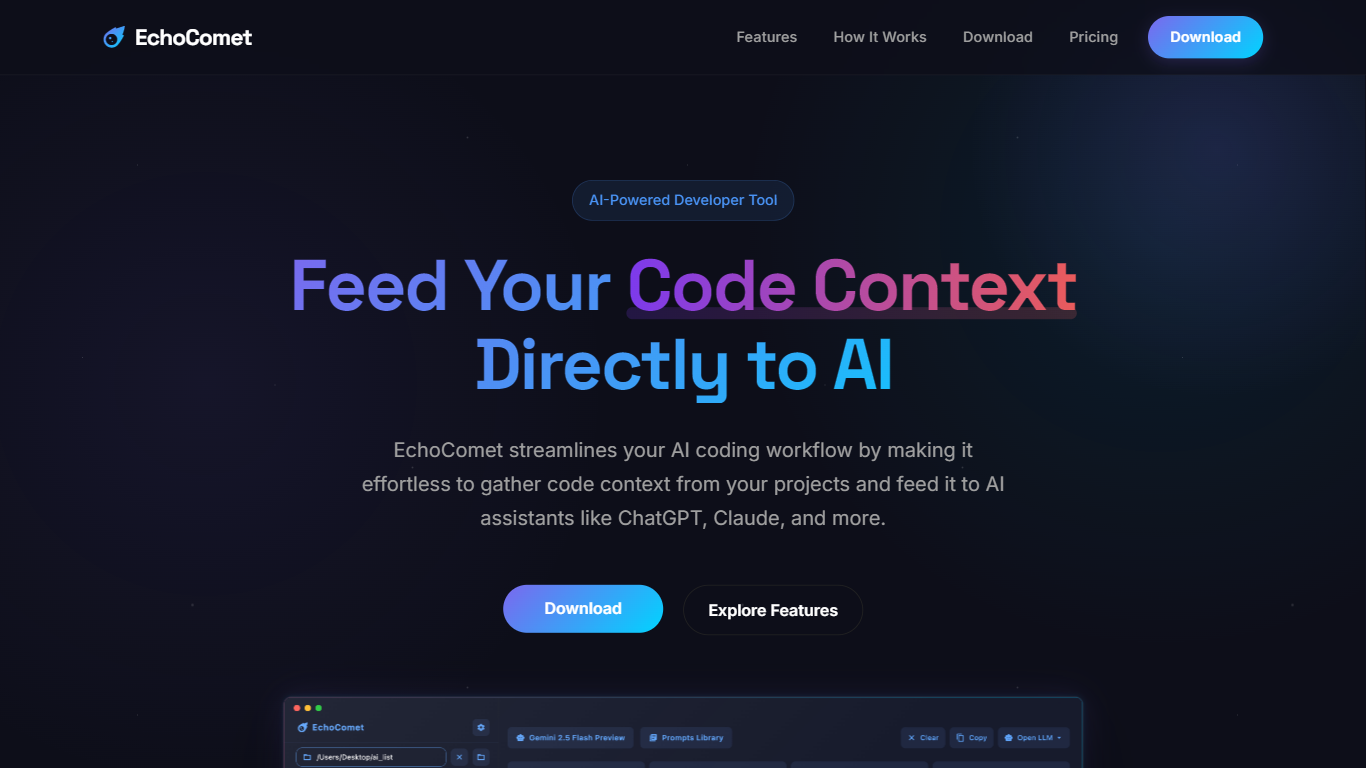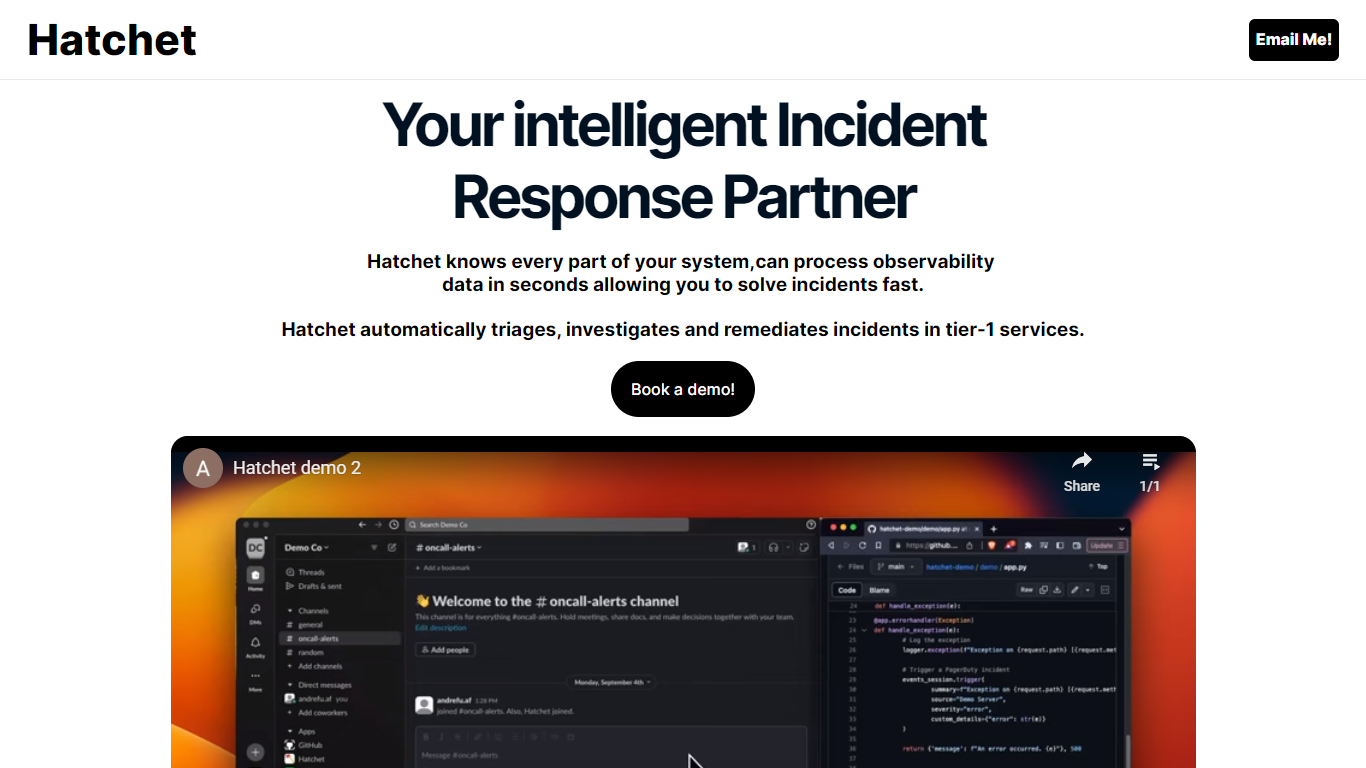EchoComet vs Hatchet
In the contest of EchoComet vs Hatchet, which AI Code Assistant tool is the champion? We evaluate pricing, alternatives, upvotes, features, reviews, and more.
If you had to choose between EchoComet and Hatchet, which one would you go for?
When we examine EchoComet and Hatchet, both of which are AI-enabled code assistant tools, what unique characteristics do we discover? There's no clear winner in terms of upvotes, as both tools have received the same number. You can help us determine the winner by casting your vote and tipping the scales in favor of one of the tools.
Does the result make you go "hmm"? Cast your vote and turn that frown upside down!
EchoComet

What is EchoComet?
EchoComet is a tool designed to enhance the AI coding workflow by allowing users to seamlessly gather code context from their projects and feed it directly to AI assistants like ChatGPT and Claude. This tool is particularly beneficial for developers who face challenges with IDE-based AI code editors that often have limited context capabilities. By bridging the gap between a user's codebase and web-based AI platforms, EchoComet enables the handling of complex coding problems that require extensive context, making it an essential tool for modern developers.
The target audience for EchoComet includes software developers, data scientists, and anyone involved in coding who seeks to improve their interaction with AI models. These users often need to provide context to AI systems to receive accurate and relevant responses. EchoComet simplifies this process, allowing users to focus on their coding tasks while ensuring that the AI has the necessary information to assist effectively.
One of the unique value propositions of EchoComet is its ability to gather code from selected files or entire folders effortlessly. This eliminates the tedious process of manually copying and pasting code snippets, which can be time-consuming and prone to errors. By organizing the code into a single block along with the user's questions, EchoComet enhances the clarity and specificity of the prompts sent to AI models, leading to better responses.
Key differentiators of EchoComet include its privacy-first design, which ensures that no data is stored or processed on external servers, as everything is handled locally on the user's device. This feature is crucial for developers who prioritize data security and privacy. Additionally, EchoComet integrates with popular AI services like OpenAI and Anthropic, allowing users to connect using their own API keys, further enhancing its versatility and usability.
Technically, EchoComet is compatible with macOS 10.15 (Catalina) and newer versions, and it is available as a universal binary for both Intel and Apple Silicon. This ensures that a wide range of users can access the tool without compatibility issues. With a one-time purchase model for lifetime access, EchoComet offers a cost-effective solution for developers looking to supercharge their AI-driven development workflow.
Hatchet

What is Hatchet?
Hatchet is your go-to AI companion designed to streamline incident responses for on-call engineers—offering a swift and smart solution to triage, investigate, and deploy fixes faster. This intelligent system understands every part of your infrastructure, processing observability data in mere seconds, so you can resolve issues rapidly and efficiently. With its ability to automatically triage, investigate, and remediate incidents, especially in critical tier-1 services, Hatchet injects relevant context into incidents to save time and resources.
For enhanced data security, Hatchet is deployed as an on-premises, self-hosted solution with robust security features—including Code Llama 2, no telemetry, permissions management, audit trails, single sign-on (SSO), and version control—ensuring your data remains within your virtual private cloud (VPC). Hatchet boasts easy integration into any alerting system by calling it at the service's entrypoint and pointing it to the log file, after which it takes over to work its magic.
EchoComet Upvotes
Hatchet Upvotes
EchoComet Top Features
Effortless Code Gathering: Easily browse and select files or folders from your codebase, eliminating the need for manual copy and paste, which saves time and reduces errors.
AI-Powered Question Enhancement: Use AI to analyze your code and improve your questions, making them clearer and more specific for better responses from AI models.
Direct Sending to LLMs: Send your organized code, analysis, and questions directly to web-based LLMs that can handle millions of tokens, simplifying the process of solving complex problems.
Instant Code Analytics: Get immediate statistics about your code, including line count, character count, and estimated AI token usage, helping you understand your code better.
Privacy-First Design: EchoComet processes everything locally on your device, ensuring that your data is never stored or processed on external servers, which enhances security.
Hatchet Top Features
Automated Triage & Investigation: Automatically processes incidents, streamlining the workflow of resolving issues.
Data Security: Ensures data security with 100% on-prem training and zero telemetry for in-VPC data privacy.
Intelligent Context Injection: Provides relevant context into incidents to save time and minimize resource expenditure.
Rapid Problem Resolution: Capable of ingesting logs, codebases, and knowledge hubs for instant issue resolution.
Easy Integration: Offers effortless integration into alerting systems for streamlined incident handling.
EchoComet Category
- Code Assistant
Hatchet Category
- Code Assistant
EchoComet Pricing Type
- Paid
Hatchet Pricing Type
- Freemium
